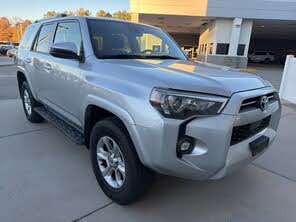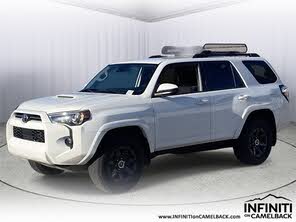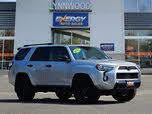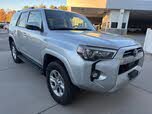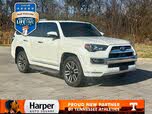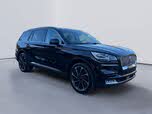2021 Toyota 4Runner vs 2020 Lincoln Aviator
Overview | |
MSRP$51,100 | MSRP$36,765 |
Listings583 | Listings1097 |
Ratings & Reviews | |
User Reviews | User Reviews |
Expert reviews8.2 out of 10 | Expert reviews6.2 out of 10 |
Pros
Cons
| Pros
Cons
|
2020 Lincoln Aviator Reviews SummaryThe heyday for Lincoln was more than a half-century ago. Those postwar years of prosperity and optimism were the perfect time for cars like the Continental and others. They delivered comfort and luxury, wrapped in midcentury modern styling. Even as recently as the 1990s, Lincoln was still a popular brand, riding the SUV craze with its Navigator. But after the turn of the century, Lincoln lost its ability to create new designs and looked inward and backward. Sure, retro-themed cars like the redesigned Mustang, PT Cruiser, and Chevy HHR had turned some heads, but none of those came from luxury brands. The BMWs and Mercedes of the world were all looking forward and pushing the envelope for contemporary automotive design. Meanwhile, Lincoln offered the MKX, which was based on the Ford Edge and featured ’66 Continental styling. Neat in a vacuum, but off-base compared to the modern luxury market. This experimental phase with various retro looks coincided with the move to the MK-# alphabet-soup naming convention and big improvements in the Ford lineup, where top-end trims of the Fusion overlapped with an entry-level trim of the MKZ. The combination left Lincoln a confusing, anonymous afterthought in the modern luxury game. But Lincoln is finally ready to change all that. It has a new cohesive design language, its focus is once again on luxury, and the three-letter naming convention that never meant anything to anyone other than Lincoln marketers is gone. The brand led with the 2017 Continental and 2018 Navigator, which are each impressive in their own right. But the company's lineup is growing and now includes the all-new 2020 Lincoln Aviator. Named after a luxury variant of the 2002-2005 Ford Explorer, this new Aviator is also based on the contemporary Explorer platform, but it's a luxury vehicle in its own right. Much of the success of the Lincoln brand may hinge on this midsize, 3-row luxury SUV, so you need to consider its competition, such as the Audi Q7, Infiniti QX60, and all-new Cadillac XT6. Read on to learn if Lincoln’s take on luxury will stand out in a crowded competitive field. | |
2021 Toyota 4Runner Reviews SummaryDespite its design age, poor fuel economy, rough ride, iffy handling, and marginal safety ratings, the current-generation Toyota 4Runner remains a popular choice in a midsize SUV. Why? Its reputation for reliability and resale value, coupled with its undeniable utility, rugged image, and go-anywhere and do-anything capability, are the selling points. And if that's why you want a 2021 Toyota 4Runner, it won't disappoint you as long as you accept its shortcomings. | |
No video found | |
Popular Features & Specs | |
Engine3.0L 400 hp V6 | Engine4.0L 270 hp V6 |
Drive TrainRWD | Drive Train4X2 |
Seating Capacity7 | Seating Capacity7 |
Horsepower | Horsepower270 hp @ 5600 rpm |
MPG City18 | MPG City16 |
MPG Highway26 | MPG Highway19 |
Engine | |
Engine Name3.0L 400 hp V6 | Engine Name4.0L 270 hp V6 |
Torque | Torque278 lb-ft @ 4400 rpm |
Horsepower | Horsepower270 hp @ 5600 rpm |
DrivetrainRWD | Drivetrain4X2 |
Fuel Economy | |
MPG City18 | MPG City16 |
MPG Highway26 | MPG Highway19 |
Interior | |
Seating Capacity7 | Seating Capacity7 |
Safety | |
Front Crash Overall5 | Front Crash Overall4 |
Side Crash Overall5 | Side Crash Overall5 |
Dimensions & Capacity | |
Cargo Space18.3 cu ft | Cargo Space47.2 cu ft |
Curb Weight4764 lbs | Curb Weight4400 lbs |
Height69.8 in | Height71.5 in |
Length199.3 in | Length190.2 in |
Width89.9 in | Width75.8 in |
Wheelbase119.1 in | Wheelbase109.8 in |
Maximum Payload | Maximum Payload1700 lbs |
Number of doors4 | Number of doors4 |
Maximum Towing Capacity | Maximum Towing Capacity5000 lbs |
Standard Towing Capacity | Standard Towing Capacity5000 lbs |
Overview | ||
MSRP | $51,100 | $36,765 |
Listings | ||
Ratings & Reviews | ||
User reviews | ||
Expert reviews | 8.2 out of 10Read full review | 6.2 out of 10Read full review |
Pros & cons | Pros
Cons
| Pros
Cons
|
Summary | The heyday for Lincoln was more than a half-century ago. Those postwar years of prosperity and optimism were the perfect time for cars like the Continental and others. They delivered comfort and luxury, wrapped in midcentury modern styling. Even as recently as the 1990s, Lincoln was still a popular brand, riding the SUV craze with its Navigator. But after the turn of the century, Lincoln lost its ability to create new designs and looked inward and backward. Sure, retro-themed cars like the redesigned Mustang, PT Cruiser, and Chevy HHR had turned some heads, but none of those came from luxury brands. The BMWs and Mercedes of the world were all looking forward and pushing the envelope for contemporary automotive design. Meanwhile, Lincoln offered the MKX, which was based on the Ford Edge and featured ’66 Continental styling. Neat in a vacuum, but off-base compared to the modern luxury market. This experimental phase with various retro looks coincided with the move to the MK-# alphabet-soup naming convention and big improvements in the Ford lineup, where top-end trims of the Fusion overlapped with an entry-level trim of the MKZ. The combination left Lincoln a confusing, anonymous afterthought in the modern luxury game. But Lincoln is finally ready to change all that. It has a new cohesive design language, its focus is once again on luxury, and the three-letter naming convention that never meant anything to anyone other than Lincoln marketers is gone. The brand led with the 2017 Continental and 2018 Navigator, which are each impressive in their own right. But the company's lineup is growing and now includes the all-new 2020 Lincoln Aviator. Named after a luxury variant of the 2002-2005 Ford Explorer, this new Aviator is also based on the contemporary Explorer platform, but it's a luxury vehicle in its own right. Much of the success of the Lincoln brand may hinge on this midsize, 3-row luxury SUV, so you need to consider its competition, such as the Audi Q7, Infiniti QX60, and all-new Cadillac XT6. Read on to learn if Lincoln’s take on luxury will stand out in a crowded competitive field. | Despite its design age, poor fuel economy, rough ride, iffy handling, and marginal safety ratings, the current-generation Toyota 4Runner remains a popular choice in a midsize SUV. Why? Its reputation for reliability and resale value, coupled with its undeniable utility, rugged image, and go-anywhere and do-anything capability, are the selling points. And if that's why you want a 2021 Toyota 4Runner, it won't disappoint you as long as you accept its shortcomings. |
Video | No video found | |
Popular Features & Specs | ||
Engine | 3.0L 400 hp V6 | 4.0L 270 hp V6 |
Drive Train | RWD | 4X2 |
Seating Capacity | 7 | 7 |
Horsepower | 270 hp @ 5600 rpm | |
MPG City | 18 | 16 |
MPG Highway | 26 | 19 |
Engine | ||
Engine Name | 3.0L 400 hp V6 | 4.0L 270 hp V6 |
Torque | 278 lb-ft @ 4400 rpm | |
Horsepower | 270 hp @ 5600 rpm | |
Drivetrain | RWD | 4X2 |
Fuel Economy | ||
MPG City | 18 | 16 |
MPG Highway | 26 | 19 |
Interior | ||
Seating Capacity | 7 | 7 |
Safety | ||
Front Crash Overall | 5 | 4 |
Side Crash Overall | 5 | 5 |
Dimensions & Capacity | ||
Cargo Space | 18.3 cu ft | 47.2 cu ft |
Curb Weight | 4764 lbs | 4400 lbs |
Height | 69.8 in | 71.5 in |
Length | 199.3 in | 190.2 in |
Width | 89.9 in | 75.8 in |
Wheelbase | 119.1 in | 109.8 in |
Maximum Payload | 1700 lbs | |
Number of doors | 4 | 4 |
Maximum Towing Capacity | 5000 lbs | |
Standard Towing Capacity | 5000 lbs | |
The 2020 Lincoln Aviator was positioned between the larger Navigator and the smaller MKC (later replaced by the Corsair) in Lincoln's lineup. It marked a return to real vehicle names, moving away from the previous alphabet-soup naming convention. The Aviator featured a unified design language across Lincoln's range, with elegant headlights and a prominent chrome grille. Its tapered roofline and low, wide beltline gave it a sleek, boat-like appearance. Inside, the Aviator boasted a flowing design with soft-touch materials and selective brightwork, exuding a sense of luxury without overdoing it. The seats were both elegant and sturdy, with shifter buttons designed like piano keys, hinting at a Golden Age of luxury.
The 2021 Toyota 4Runner, last redesigned 12 years prior, maintained a rugged and utilitarian design. While not conventionally attractive, its two-box body with flared fenders and trapezoidal wheel arches gave it a timeless and functional look. The 4Runner was available in various trims, including SR5, TRD Off-Road, Limited, and TRD Pro, with special editions like the Trail Special Edition. Our test vehicle, the Trail Special Edition, featured black cloth upholstery with tan stitching, all-weather floor mats, and a sliding rear cargo tray. The interior was dominated by hard plastic, which was easy to clean and in line with the SUV's rugged mission. The dashboard was old-school, with big knobs and buttons, and a traditional key ignition.










The 2020 Lincoln Aviator came standard with a twin-turbocharged 3.0-liter V6 engine, producing 400 horsepower and 415 pound-feet of torque. The Grand Touring trim combined this engine with a 100-hp electric motor, resulting in a net 494 hp and 630 lb-ft of torque. Both powertrains used a 10-speed automatic transmission, with the base V6 offering rear-wheel drive (RWD) or all-wheel drive (AWD), while the plug-in hybrid (PHEV) was AWD only. Both versions could accelerate from 0-60 mph in about 4 seconds. The PHEV provided a smooth and confident driving experience, using electric power at low speeds to enhance fuel efficiency. The Aviator's steering was light, and its brakes were cushioned, offering a refined driving experience. Fuel economy for the RWD Aviator was 18 mpg city, 26 highway, and 21 combined, while the AWD version achieved 17 mpg city, 24 highway, and 20 combined. The PHEV had a combined 23 mpg rating, with a 21-mile electric-only range and a 56 miles-per-gallon equivalent combined rating.
The 2021 Toyota 4Runner was powered by a 4.0-liter V6 engine, producing 270 horsepower at 5,600 rpm and 278 pound-feet of torque at 4,400 rpm. A five-speed automatic transmission powered the rear wheels, with a part-time 4WD drivetrain available. The Trail Special Edition did not offer automatic 4WD. The 4Runner's maximum tow rating was 5,000 pounds. On-road, the 4Runner felt slow, heavy, and clunky, with heavy steering and brakes. However, off-road, it excelled, tackling mud, hills, and ruts with ease. The 4Runner's off-road capabilities were enhanced by features like A-Trac, a locking rear differential, Multi-Terrain Select, and Crawl Control. Fuel economy was 17 mpg combined, with a highway rating of 19 mpg. During our week with the 4Runner, we averaged 16.8 mpg, giving it an average range of about 385 miles with its 23-gallon fuel tank.
The 2020 Lincoln Aviator's three-row seating placed it in competition with the Audi Q7, Infiniti QX60, Mercedes-Benz GLE, Land Rover Discovery, and Cadillac XT6. The optional second-row captain's chairs were fantastic, while the power-closing third row was adequate for adults but best suited for kids on longer trips. With the second and third rows folded, the Aviator offered 77 cubic feet of cargo space, comparable to the Cadillac XT6. However, some controls, like the seats and door handles, were overly complicated. The 30-way seats with a massage function were worth the effort to learn, but the door-release function was confusing and could be problematic in emergencies.
The 2021 Toyota 4Runner sat high off the ground, making it challenging for shorter individuals to climb aboard without running boards. Once inside, the 4Runner offered comfortable seating with proper support in both the front and rear. The back seat provided ample legroom, good visibility, air conditioning vents, and USB charging ports. The 4Runner's sliding cargo deck could hold up to 440 pounds, though it reduced cargo volume. The back bumper served as a convenient place to sit for various activities. Depending on configuration, cargo space ranged from 47.2 cubic feet behind the rear seat to 89.7 cubic feet with the rear seat folded down. The Trail Special Edition's big roof rack added to its cargo-carrying capabilities.
The 2020 Lincoln Aviator featured the Sync 3 infotainment system with a 10.1-inch touchscreen. Unlike the Ford Explorer's portrait layout, the Aviator's screen used a landscape layout, providing a better interface for Apple CarPlay and Android Auto. The Aviator also had a fully digital instrument panel and a massive head-up display, offering a lot of information in a minimalist and unobtrusive manner.
The 2021 Toyota 4Runner Trail Special Edition had limited technology features. It included a windshield wiper de-icer system and a 120-volt AC power outlet in the cargo area. The standard 8-inch touchscreen infotainment system offered Bluetooth, Apple CarPlay, Android Auto, Amazon Alexa compatibility, SiriusXM satellite radio, and five USB ports. The premium audio upgrade added dynamic navigation, dynamic point-of-interest search, dynamic voice recognition, and a one-year subscription to Destination Assist concierge services. The infotainment system's physical shortcut buttons and knobs were easy to use, even with gloves, and the voice recognition technology was effective.
The 2020 Lincoln Aviator came with a full array of front and side-impact airbags, traction control, and a tire pressure monitoring system. The Lincoln Co-Pilot360 suite included forward-collision avoidance, lane-departure warning, adaptive cruise control, automatic high beams, blind-spot monitoring, and a head-up display.
The 2021 Toyota 4Runner featured Toyota Safety Sense P (TSS-P), which included adaptive cruise control, forward-collision warning, automatic forward emergency braking, lane departure warning, and automatic high-beam headlights. However, it lacked blind-spot monitoring and rear cross-traffic warning. The 4Runner received a three-star rollover resistance rating from the National Highway Traffic Safety Administration (NHTSA) and a "Good" rating for roof crush strength from the Insurance Institute for Highway Safety (IIHS). However, its protection for the driver in a small overlap frontal-impact collision was rated as Marginal by the IIHS, and the NHTSA gave the front passenger protection a three-star rating in a frontal-impact crash.
CarGurus highlights
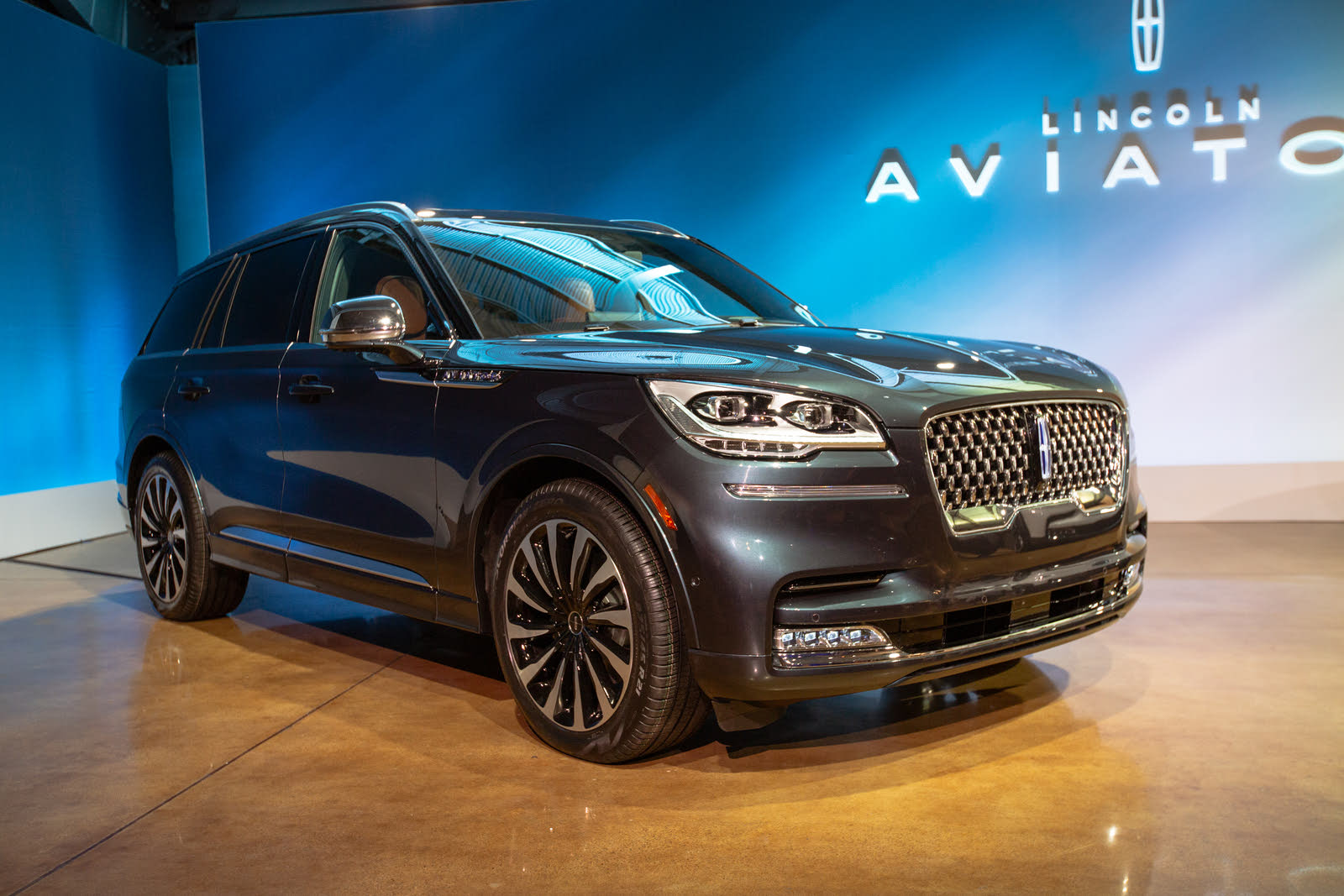
According to CarGurus experts, the overall rating for the 2020 Lincoln Aviator is 8.2 out of 10, while the 2021 Toyota 4Runner scores 6.2 out of 10. Based on these ratings, the 2020 Lincoln Aviator is the clear winner, offering a more luxurious, powerful, and technologically advanced package.
Choose the 2021 Toyota 4Runner if:
- You need a rugged and capable off-road SUV with proven durability.
- You prefer a simple, old-school design with easy-to-use controls.
- You require ample cargo space and practical features for outdoor adventures.
Choose the 2020 Lincoln Aviator if:
- You prioritize a luxurious and comfortable interior with advanced features.
- You want a powerful engine with a plug-in hybrid option for better fuel efficiency.
- You value a comprehensive suite of safety and driver-assistance features.
CarGurus highlights

According to CarGurus experts, the overall rating for the 2020 Lincoln Aviator is 8.2 out of 10, while the 2021 Toyota 4Runner scores 6.2 out of 10. Based on these ratings, the 2020 Lincoln Aviator is the clear winner, offering a more luxurious, powerful, and technologically advanced package.
Choose the 2021 Toyota 4Runner if:
Shop Now- You need a rugged and capable off-road SUV with proven durability.
- You prefer a simple, old-school design with easy-to-use controls.
- You require ample cargo space and practical features for outdoor adventures.
Choose the 2020 Lincoln Aviator if:
Shop Now- You prioritize a luxurious and comfortable interior with advanced features.
- You want a powerful engine with a plug-in hybrid option for better fuel efficiency.
- You value a comprehensive suite of safety and driver-assistance features.

By: CarGurus + AI
At CarGurus, our team of experienced automotive writers remain at the heart of our content operation, conducting hands-on car tests and writing insightful guides that are backed by years of industry experience. To complement this, we are harnessing AI to make our content offering more diverse and more helpful to shoppers than ever. To achieve this, our AI systems are based exclusively on CarGurus content, ratings and data, so that what we produce is both unique to CarGurus, and uniquely helpful to car shoppers.


